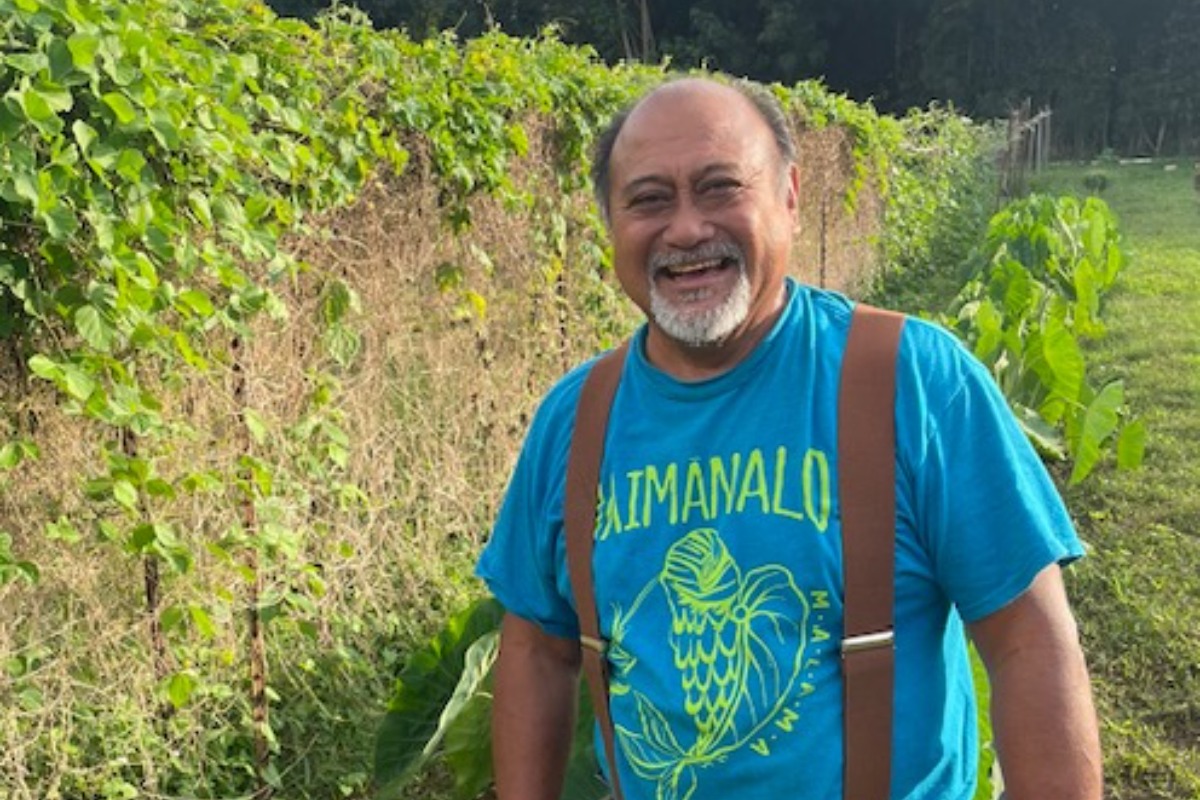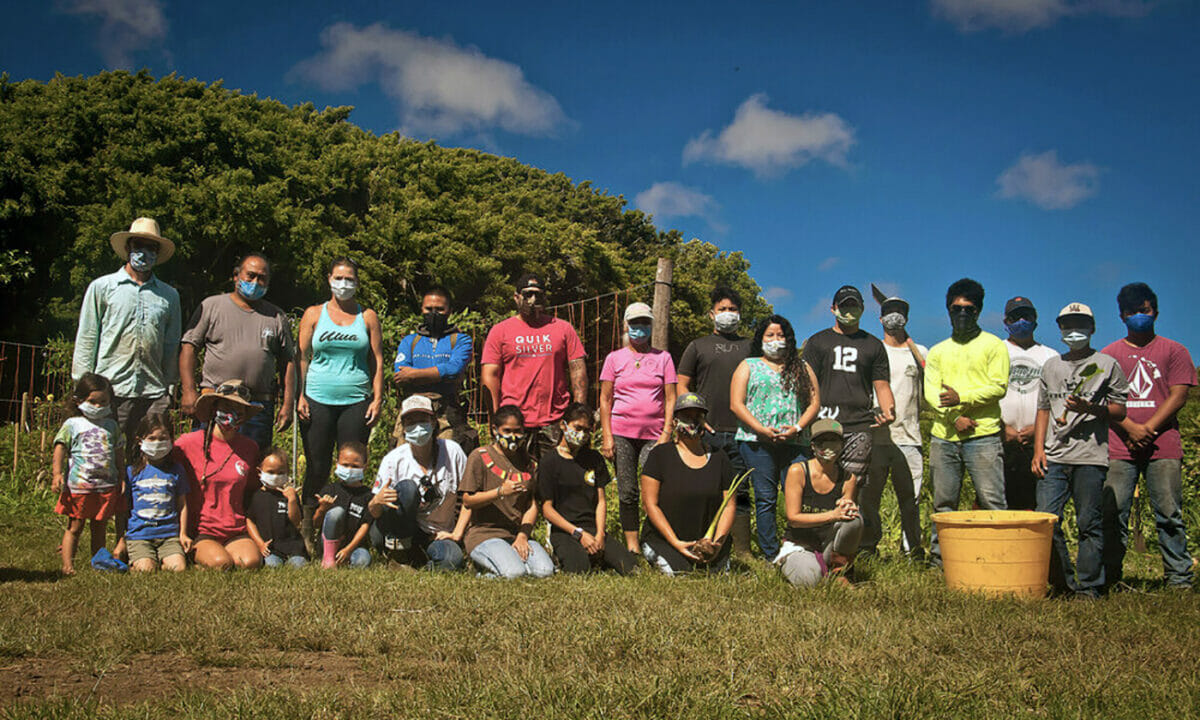Kahua Pa’a Mua’s executive director, David Fuertes, believes sustainability not only comes from connecting with the land but also to each other.

In 2012, after the Great Recession, legislation was introduced in Hawaii that acknowledged and attempted to solve the archipelago’s dangerous dependence on imported food.
At the time, 92 percent of Hawaii’s food was coming from somewhere else.
However, before the legislation was introduced, in North Kohala, the rural northern tip of Hawaii Island that’s zoned mainly for agriculture, community leaders had already come up with a plan to reach 50-percent food self-sufficiency in the next two decades.
One of those community leaders was David Fuertes, who along with his wife Carol, decided, in response, to form the agriculture education nonprofit Kahua Pa’a Mua.
Initially an expansion of a family taro cooperative, the nonprofit has grown in the last 12 years to have culturally rooted ‘aina (land)-based programs for both youth and adults, where the goal is not just to empower them to grow their own food but to foster aloha and togetherness.
[RELATED: Mending Hawaii’s Lack of Food Security Through Breadfruit]
Fuertes, who came from a long line of community builders and homesteaders, moved to North Kohala in 1975, but he grew up as one of eight children in Kauai, where his father migrated from the Philippines to work for one of Hawaii’s many sugarcane plantations.
His father was one of the community organizers of fellow plantation workers to strike for better work conditions and pay. Low wages led many plantation families, including the Fuertes’, to sustain themselves with their own gardens, chickens and goats.
While having that garden left an impression, it wasn’t until Fuertes was 14, when his agriculture teacher had him learn to recite the creed from the Future Farmers of America (FFA), that Fuertes would begin his life-long agriculture journey and craft the values that would help him fulfill his vision for wanting to help the community down the line.
Founded in 1928, the FFA is one of the largest youth organizations in America, promoting agriculture education. Its creed—which involves faith, leadership, maintaining a fondness for the work in times of discouragement and bringing abundance to others, not just oneself—is something Fuertes still recites.
It would be one of his fellow FFA colleagues that would eventually donate five acres of unused land to Fuertes and become home to the nonprofit’s agricultural Learning Lab farm.

Photo by Malia Welch.
At that farm, along with another five acres that contains their certified imu (underground oven), they have their Ho’okahua Ai (HA) youth mentorship program, which teaches students from ages 13 to 21 about animal husbandry and crop production to grow and distribute food throughout the community. Ho’okahua Ai in Hawaiian translates to: “to build a foundation of nutrition, sustenance, communication and sharing.”
“What we teach our students are values, not just planting, which I think strengthens the program and has our kids coming back,” says Fuertes, adding that part of his purpose is to help the youth connect more to who they are, so they can more easily connect to their purpose.
The youth initiative sustainably employs both organic farming and Korean Natural Farming methods. The latter fertilizes soil with indigenous microorganisms from one’s surrounding area, helping to produce healthy soil and high-yield crops.
These methods are also employed by the nonprofit’s Ohana Agriculture Resilience (OAR) initiative, which provides six to 10 families with two 100-foot crop rows to grow whatever they want on their farm for free.
[RELATED: The Struggle to Contain, and Eat, the Invasive Deer Taking over Hawaii]
Over the course of a year, families learn various aspects of farming and animal husbandry, attending several workshops led by Fuertes with other mentors and organizations, which teach topics such as plant propagation, crop production, aquaponics, poi-making and Hawaiian plant medicine practices.
Once they graduate from the program, the families have a choice of equipment to continue their own operations at home. Options include a mobile pen called a chicken tractor to raise chickens, a Korean Natural Farming odorless pigpen that composts manure and processes toxins under the pig’s feet or an aquaponics tank to grow fish and soil-less produce.
During the pandemic, the OAR families organized to plant more crops to help feed the community. They ended up growing and giving away hundreds of pounds of produce and poi to the food insecure, many of which were area kupuna (elders).
The nonprofit also partnered with youth conservation nonprofit KUPU to host a farm training initiative for those who lost their jobs due to the COVID-19 pandemic, giving them pay and benefits to work alongside the HA and OAR programs.
“My thing is bringing people together, working together and finding a common purpose,” says Fuertes, who hopes to maximize the same values in the community to make Kohala a better place. “It’s not for us now. It’s for the next generation and the generation that’s not even born yet. That’s who we’ve got to work for.”
David! Mahalo nui loa! You are awesome! Proud to say you are a Waimea High School graduate! Aloha!